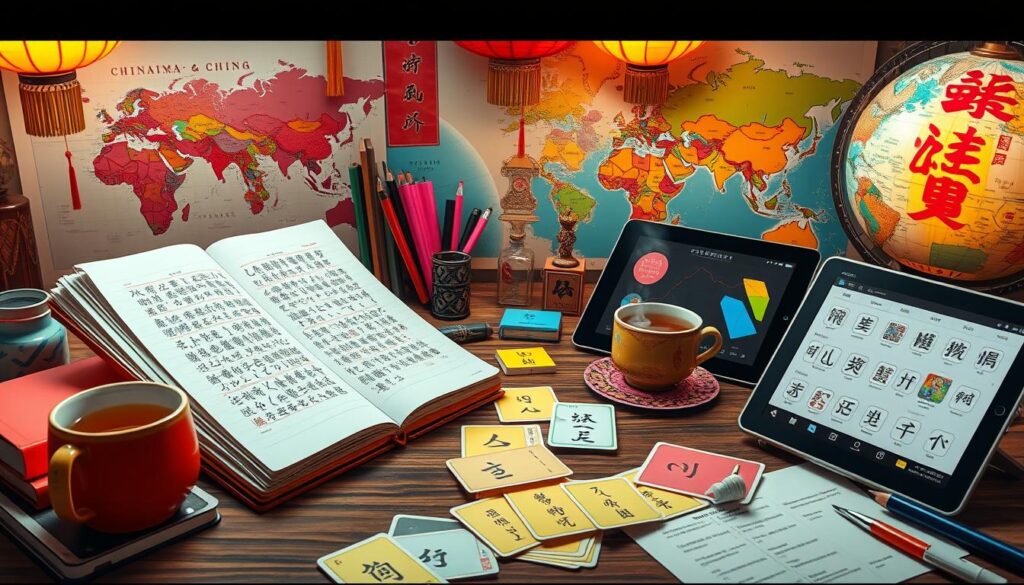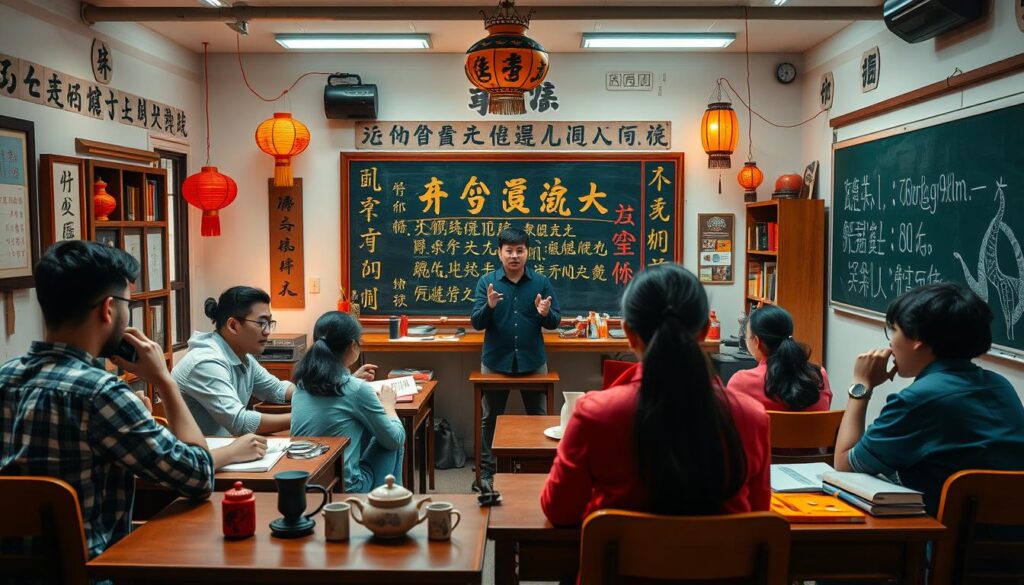Getting ready for a trip to the heart of Asia means diving deep into Chinese culture. Before exploring the lively streets or the Great Wall, think about learning Mandarin for travel. This language opens doors to amazing experiences. Mandarin isn’t just spoken in China, but also in Taiwan and Singapore, making it very important.
When you start learning Mandarin vocabulary for travel, you’re getting more than words. You’re getting keys to unlock real conversations and understanding. Picture the smile of a vendor in Guangdong or the nod from an elder in Fujian because you tried speaking their language. Even though places like Shanghai and Taiwan have their own dialects, Mandarin connects everyone in China.
Learning the language might seem hard with 2,500 characters and the tones that change meanings. But tools like Google Translate and apps like Pleco make it easier. Still, real interactions are the best. Like sharing a laugh when you say “Xièxiè” wrong or thanking someone for directions to “Xǐshǒujiān zài nǎlǐ?”
Knowing simple phrases like “Nǐhǎo” to “Zàijiàn” makes your trip better. It turns every “Wǒ bù dǒng” into a chance to learn and connect. By learning “Hǎo” and “Bù hǎo”, you’re not just a tourist. You become someone who really knows how to travel.
Using Mandarin to bargain for gifts with “Tài guìle!” or describe tasty food with “Hào chī” adds personal stories to your experience. So, get ready to dive into China’s vibrant life. Remember, to learn Mandarin for travel is to embrace the culture. It makes your trip a memorable part of your story.
The Importance of Mandarin Language for Travelers in China
Traveling through China opens your eyes to a world of ancient history and modern vibrancy. Learning Mandarin for travelers does more than help you order food or find your way. It changes your trip from just looking around to truly understanding the culture you’re in.
Overcoming Linguistic Challenges While Exploring China
Mandarin is the most spoken language worldwide, central to China’s complex culture. While English is common in big cities, it’s rare elsewhere. Learning basic Mandarin helps you move beyond translator apps, which often fail due to language differences. It lets you navigate and explore with confidence.
The Role of Mandarin in Connecting with Local Culture and People
Mandarin is more than a way to speak; it’s a key to China’s heart. It helps you connect with locals in a meaningful way. Those who learn Mandarin understand China’s culture and history better, finding their journey more enriching. They see the country’s true colors, beyond the usual tourist paths.
The Prevalence of Mandarin Across China Versus Regional Dialects
In China’s diverse landscape, Mandarin unites the country. It’s essential for travelers, making trips smoother across different areas. Whether in busy Beijing or peaceful Yuanyang, knowing Mandarin eases communication. Many travelers face language challenges, but those with Mandarin skills enjoy their adventures more.
Beginner’s Toolbox: Essential Mandarin Phrases for Tourists
Heading to China? Learning essential Mandarin phrases will truly make your trip better. This will help whether you’re ordering food, asking where things are, or just saying hello. Here’s a list of helpful Mandarin phrases for travelers to help you in everyday situations.
- Nǐ hǎo (你好) – Hello
- Xièxiè (谢谢) – Thank you
- Bù hǎo yì sī (不好意思) – Excuse me/May I ask…
- Zàijiàn (再见) – Goodbye
- _ _ _ zài nǎlǐ? (___在哪里?) – Where is _ _ _?
- Zhè ge (这个) – This one
- Duōshǎo qián? (多少钱?) – How much is it?
- Wǒ yào zhè ge (我要这个) – I want this one
- Jiù mìng a! (救命啊!) – Help!
- Wǒ xūyào bāngzhù (我需要帮助) – I need help
Learning Mandarin is not just about words; it’s about connecting with people. A simple Nǐ hǎo can start friendships and open up chances. If you want to get better at the language before your trip, there are great resources. Check out language learning platforms for beginners. They offer courses and interactive tools.
To help with your language journey, you should use digital tools. Tools like PDFs of dialogues, videos, and audio lessons are great. They show how to use phrases in real life.
Every new phrase you learn gets you closer to the real China. Keep a Mandarin guide with you and practice speaking. Have a safe and fun trip learning!
Mastering Basic Conversational Mandarin for Smooth Travel Experiences
The allure of traversing through Mandarin-speaking regions is on the rise. Enhancing your language skills for travelers is crucial, not just optional. By learning Chinese for holiday experiences, you equip yourself with essential tools. These tools help you navigate scenarios, from bustling marketplaces to tranquil countryside villages.
Immersing yourself in the basics of Mandarin conversation enriches your travel experiences. It’s not just about getting by; it’s about engaging deeply with culture. Whether ordering jasmine tea or finding a hidden temple, the benefits of learning Chinese are practical and cultural.
Greetings and Common Courtesies
Starting with simple pleasantries like “Nǐ hǎo” (Hello) and “Xièxiè” (Thank You) paves the way for friendly interactions. It also shows respect for the local customs. Engaging with locals through these utterances can transform your travel experience. It gives you insights into the daily life and traditions of the places you visit.
Navigational Language for Getting Around
Knowing directional phrases like “Zuǒ” (left) and “Yòu” (right) is indispensable when exploring off the tourist paths. Language skills facilitate exploration. They allow you to take charge of your journey and navigate through metropolitan areas and quaint neighborhoods alike.
Phrases for Dining and Shopping Essentials
Converse effortlessly in eateries and markets with key phrases such as “Mǎidān” (Can I have the bill?) and “Bùyào là” (No chili). These phrases ensure your culinary needs are met. Celebratory expressions like “Gānbēi!” (Cheers!) liven your dining experiences and bond you with new friends.
Travel language learning unveils the authentic lifestyle and practices otherwise overlooked. Equipping yourself with language competence is about experiencing life through the local lens. As you learn Chinese for holiday experiences, you open doors to new dimensions of travel. This goes beyond sightseeing, making every interaction memorable and every discovery a story worth sharing.
Learn Mandarin for Travel: Tools and Resources to Get Started
If you’re planning a trip to China or just curious about languages, learning Mandarin is a great idea. It can really make your travel more enjoyable. You’ll find tips on mastering Mandarin vocabulary for travel here, helping you dive into China’s culture smoothly.
Language Learning Apps and Digital Resources
Many apps and websites today make learning Mandarin easy and fun. For example, Pleco helps with quick translations, perfect for reading signs or menus. Meanwhile, Duolingo teaches key phrases for different situations, like saying hello or asking for directions. For beginners wanting more, click here for a great starting point.
Online Courses and Virtual Classrooms
Prefer a classroom setting? There are online options too. Sites like eChinese Learning and GoEastMandarin offer levels from beginner to advanced, with live teacher interactions. This route helps if you’re interested in deep cultural understanding along with language skills.
Utilizing Social Media for Language Practice
Platforms like Instagram and TikTok can be surprisingly educational for learning Mandarin. Follow accounts that share daily Mandarin for tourism. You’ll get fun lessons on everything from ordering food to finding your way around. It’s an easy way to practice learn Mandarin for travel in spare moments.
| Resource Type | Cost | Description |
|---|---|---|
| Pleco App | Free | Live word lookup and vocabulary flashcards for travelers. |
| Rocket Languages | Free – $250 | Comprehensive Mandarin courses from introductory to advanced. |
| eChinese Learning | $8 – $25 per lesson | Skype lessons that cater to varying proficiency levels and real-time interaction. |
Learning Mandarin isn’t just about getting by on your trip. It opens up China’s rich history and culture in a new way. By using these resources, you’ll enjoy your travels on a deeper level. Discover more than you would as just a visitor.
Tips for Practical Language Use in China
Starting your adventure in China with a good knowledge of essential Mandarin phrases can change your trip for the better. To make the most of your travel language learning, learn important phrases and use technology that helps you in a place where not many speak English.
Knowing how directly people speak Mandarin helps you understand others better. This is because people in China speak clearly and to the point. This is very useful when shopping in markets. For example, knowing how to say “No chili” is great if you don’t like spicy food.
Saying “Thank you” might not happen as often as you’re used to. It’s good to know this so you don’t get the wrong idea when talking to people. Getting to know these details about Mandarin really helps when you’re traveling.
Even though many places use international signs, being able to say where you want to go in Mandarin is very useful. When you try to speak their language, locals usually like it and are more helpful. People everywhere appreciate it when you try to speak their language.
Tools like FluentU can help you learn better because they use videos from real life. It’s a fun and educational Mandarin speaking guide for trips.
- Knowing some phrases for getting around saves you from many travel troubles.
- It helps to have important travel phrases written in Pinyin, so help is always close by.
- Making voice recordings of people speaking can help you practice and get better each time you try.
Having a basic knowledge of Mandarin phrases is very helpful for a better trip. Whether you need to find a bathroom or discuss taxi prices, using Mandarin makes your journey more interesting. Every conversation becomes a special part of your trip.
| Travel Scenario | Useful Mandarin Phrases | Remarks |
|---|---|---|
| At the airport | 请问,机场在哪里? (Qǐngwèn, jīchǎng zài nǎlǐ?) | Asking for directions to the airport |
| Dining | 这个不要辣 (Zhège bù yào là) | Popular phrase to request non-spicy food |
| Taxis and Buses | 请带我去这个地址 (Qǐng dài wǒ qù zhège dìzhǐ) | Essential for specifying your destination |
Cultural Insights: Understanding Etiquette and Non-Verbal Communication
Learning Mandarin goes beyond words. It’s tied to actions and traditions. In China, knowing small gestures and practices is key. Words like “Ren” (仁) for kindness and “Li” (礼) for manners show this deep connection. They open a door to understanding cultural rules. For example, when giving gifts, use both hands. This shows respect. Also, it’s polite to refuse gifts a few times before accepting. This respects local traditions.
When aiming to learn Chinese for your travels, pay attention to words about family and social order. “Jia” (家) means family, and “Nian” (年) is used for elders. These words reflect the culture, guiding how to act around others. Always speak to elders first in a group. Let them sit first at meals. Understanding these norms shows respect. It also helps you avoid offending someone, which could hurt their “face” or dignity.
Learning for travel isn’t just about words. It includes non-verbal rules and community habits. At meals, leave a little food on your plate. This thanks your host. How you handle chopsticks also matters. These actions show you understand the culture. Avoid giving clocks or umbrellas as gifts. They have bad meanings. Knowing about festivals and their special words also enhances your travel experience.


